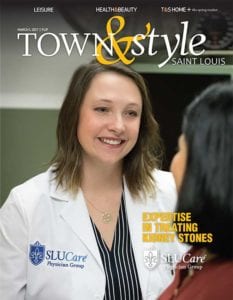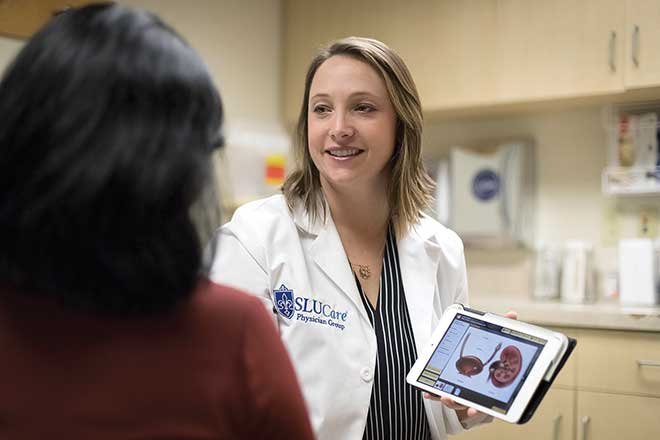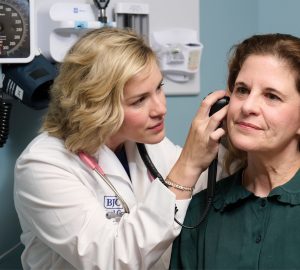Anyone who’s had a kidney stone—or witnessed a loved one in the throes of an attack— will tell you it’s a pain that rivals that of natural childbirth. Dr. Lindsay Lombardo, general urologist with SLUCare Physician Group, does not dispute it, and she should know, having trained at one of the biggest stone centers in the country, John H. Stroger Jr. Hospital of Cook County in Chicago. Lombardo now brings her expertise to SLUCare Physician Group and performs surgeries at SSM Health Saint Louis University Hospital and SSM Health St. Mary’s Hospital, where she marshalls everything available to treat common, rare and complex urological conditions.
One of the first patients Lombardo operated on when she came to town in 2015 was 79-year-old Elva Marie Bennett. “Right away, I knew I was in excellent hands,” Bennett says, adding that previous care in other health systems had not served her well. Bennett says her case required a particularly high level of expertise because she was born with a fused ‘horseshoe’ kidney and also is a cancer survivor. “Because we are an academic facility, we can take complicated patients,” Lombardo explains. “We have the resources and specialists available whenever they are needed.” Over the last eight months, Bennett has had three separate procedures and all have been ‘wonderful.’ “No pain, no problems at all,” she reports.
Stones, Lombardo explains, are small, hard mineral deposits made of substances like calcium, oxalate, phosphate and uric acid. Most range between 1 mm and 1 cm in size. But a ‘staghorn’ stone fills the kidney’s entire collecting system and can be as large as 8 cm. In severe cases, a stone like this can disrupt the organ’s function completely.
The No. 1 caus e of kidney stones is dehydration, Lombardo explains, adding that a common misconception is that the discomfort is caused by the stone scraping the sides of the ureter (the tube that drains the kidney). Actually, it’s from the backup of urine (due to the obstruction), which painfully stretches the system. Other symptoms include nausea and vomiting, blood in the urine and fever, usually from a kidney infection; men also may experience testicular pain. Sometimes, however, a stone may elicit no pain at all and be discovered completely by chance on an X-ray taken for another reason.
e of kidney stones is dehydration, Lombardo explains, adding that a common misconception is that the discomfort is caused by the stone scraping the sides of the ureter (the tube that drains the kidney). Actually, it’s from the backup of urine (due to the obstruction), which painfully stretches the system. Other symptoms include nausea and vomiting, blood in the urine and fever, usually from a kidney infection; men also may experience testicular pain. Sometimes, however, a stone may elicit no pain at all and be discovered completely by chance on an X-ray taken for another reason.
There are different lines of attack, and at SLUCare Physician Group, Lombardo offers them all. Extracorporeal shock wave lithotripsy is a noninvasive procedure that uses shock waves to break up stones from outside the body, while the minimally invasive ureteroscopic stone extraction uses a scope internally to remove stones. During another minimally invasive procedure, percutaneous nephrolithotomy, a pneumatic probe inserted through the skin ‘hammers’ the stone to ‘shatter’ it, and another instrument grabs and removes the smaller pieces. Robot-assisted pyelolithotomy, which Lombardo performed on Bennett, uses a new technology to cut the kidney open from the inside. All procedures are performed under general anesthetic with varying recovery times depending on the case.
All that said, a 2-mm stone has an 85 percent chance of passing on its own in about eight days, and half the time, a stone measuring 5 mm will pass in 23 days, according to Lombardo. Drinking water can speed the process and significantly reduce the likelihood of stones recurring. “On 2 liters of water a day, 50 percent of first-time stone-formers will not form another,” Lombardo says.
The physician says she is happy in her new home. “The camaraderie and collaboration between SLUCare and SSM Health make this a special place to be,” Lombardo says.
SLUCare urologists use the latest technologies and minimally invasive techniques to treat common, rare and complex urological conditions. Pictured at top and on the cover: Dr. Lindsay Lombardo. For more information, call 314.577.6131 or visit slucare.edu/urology.
Cover design by Julie Streiler | Cover photo courtesy of SLUCare Physician Group









